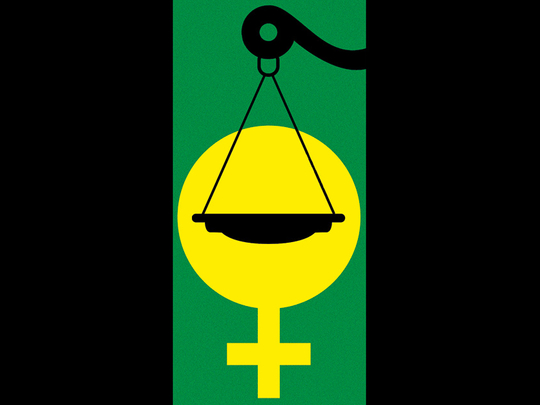
October 6, 2013 was a momentous day for female activists in the Kingdom of Saudi Arabia. That was the day when the Ministry of Justice, a male dominated bastion finally relented and granted four Saudi women the licence to practice law in the country. Previously female law graduates, some of whom had achieved a doctorate in the legal profession and whose only hope in working in this field was as legal consultants to law firms were not allowed to practice law or be given attorney status. They could not appear in courtrooms and all their legwork had to be done behind the scenes. They could also not own or operate their own law firms.
With doors opening for women that had earlier remained shut, the Saudi legal system had finally succumbed to pressure raised by female law graduates since 2011 when they started a concerted campaign that would allow them to fight cases in a courtroom like their male counterparts.
Bayan Mahmoud Al Zahran became the first Saudi woman lawyer to take centre stage when she appeared at the General Court in Jeddah for the first time in November 2013 to defend a client. She had been working for years as a legal consultant and had represented dozens of people in criminal and civil cases besides family disputes.
Woes of destitute women
Encouraged and determined by her entry into the previously forbidden domain, Al Zahran established the first female law firm in the kingdom in January of 2014 and her firm has since committed itself to the protection and preservation of the rights of females in the Saudi patriarchal community. At the time she said, “I believe women lawyers can contribute a lot to the legal system. This law firm will make a difference in the history of court cases and female disputes in the kingdom. I am very hopeful and thank everyone who supported me in taking this historical step.”
In 2009, she began her career primarily listening to the woes of women left at the mercy of charitable societies with no family member to care for them. She took in all their stories and words and gradually a determination formed in her mind that she would not allow the victimisation of women to continue unchallenged.
She recalls that “there were many obstacles in 2009 when I started representing women who were beaten or mistreated. The difficulty I had to face was the mindset, not just from men but also women who did not have much faith in the abilities of female lawyers. But with a consent from many of the women’s health care societies to protect them and their rights, I began to overcome this feeling and work to protect these females and their rights. Being a women and working at that time was different! Gradually with time and after the women were empowered in this field and their status made official with rights and duties, we became equal just like the men.”
Realising that women whose rights had been violated in the past by male family members were shunned and marginalised by the male dominated legal system, as most judgements usually ended up in the male’s favour, Al Zahran is determined to make a difference. On occasions, she says she had to reach out beyond her border for foreign help in dealing with complicated female issues. She also has to fight the stereotype mindset of many of her male associates in the field who think of her as an intrusion into their club.
“The courts and government departments have been dominated by men for such a long time that they have begun to believe that they are better at the job.” She was all praise of the late king Abdullah Bin Abdul Aziz’s bold initiative to overhaul the existing judicial system and allow women an entry into the field.
In recent times, Al Zahran was successful in getting a stay order on a court ruling by Jeddah’s general court which had awarded custody of a two-year-old girl to her father based on the mother’s non-appearance in court. After reviewing the case file and the Sharia, Al Zahran demanded “the stopping of the ruling issued against my client and contested for legal reasons that are related to form and subject matter, the most important of which is the presence of our client to court sessions and her ignorance of these sessions.”
During those intense sessions, she says that there was a fair share of hostility from the father’s side. “I was threatened of being burnt alive by an opponent after I received an initial verdict in favour of the mother. I reported it to the authorities and took the right legal measures.” Fortune Magazine and ArabianBusiness.com have listed Bayan Al Zahran among the most influential Arab women in the world. But accolades is not what Al Zahran seeks. “I want to raise my children and make sure they grow up with the right Islamic principles and social rights, and they contribute to society. I want to support the law graduates and help them find employment in their fields. I also want to provide legal awareness to women in charitable societies throughout the kingdom.”
Tariq A. Al Maeena is a Saudi socio-political commentator. He lives in Jeddah. You can follow him on Twitter: @talmaeena.









